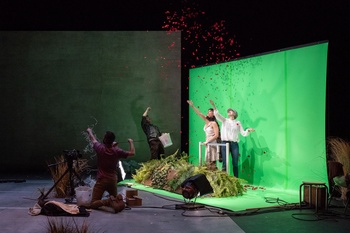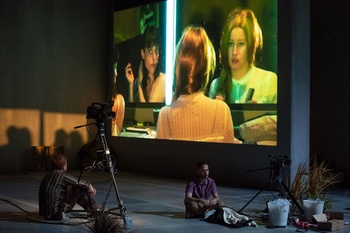In 2018, we commemorated the demonstrations in May ’68 in Paris. But there were not only demonstrations in May ’68 and they did not only take place in Paris. In My Revolution Is Better Than Yours, Brussels-based theatre-maker Sanja Mitrovic explores the missing stories, combined with a focus on the battles that are still being fought today.
Sanja Mitrovic grew up in the former Yugoslavia in the 1990s. In 2001, she moved from Belgrade to the Amsterdam University of the Arts, and in 2014, she moved to Brussels, where her company Stand Up Tall is based and where she teaches (at the RITCS) and conducts doctoral research. Mitrovic is currently also preparing the piece Danke Deutschland for the Schaubühne in Berlin, which explores the criteria with which migrants have to comply to be considered a “good German citizen”, and how the relationship between Germany and its migrants changed due to the political circumstances between the late 1970s and the present day. The theme of migration and the willingness to oppose abuses are likewise prominent in My Revolution Is Better Than Yours, and they are of course not foreign to Mitrovic’s own past.
You have personal experience of revolutionary protest and migration.
Sanja Mitrovic: I was still living in Serbia when the protests against President Slobodan Miloševic erupted. Eventually we brought down his regime on 5 October 2000 and introduced democracy to Serbia. But I had already wanted to leave the country for several years by that point because I had participated in the student protests in 1996, and I was disappointed by how that protest and political action had failed and the land was entirely governed by corruption.

Did those experiences provide some inspiration for My Revolution?
Mitrovic: Initially, my plan was to compare Paris in ’68 with Belgrade in ’68, but while conducting research I realized that this focus would be far too limited. The demonstrations in that period were a global phenomenon and I wanted to emphasize that at precisely the time that each country was focusing on their own specific role during the commemorations of ’68. There was also the Prague Spring and there were protests on Red Square in Moscow and the Massacre of Tlatelolco in Mexico. Each protest had its own agenda, of course, but they were the result of a domino effect. The student protests in Europe were a continuation of the demonstrations against the Vietnam War in the United States. The Prague Spring took place in January ’68, Warsaw followed in March, Berlin in April, Paris in May, Belgrade in June.
Incidentally, this repetition and succession is also a theatrical element that we use in My Revolution, which is performed by actors from various countries in their own language: Russian, Hungarian, Serbian, French, Polish. During the long research period that preceded the piece, we discussed the legacy of ’68, from the sexual revolution to the wars of African independence or the political developments in South America. We watched films, read diaries and accounts by people who took part in ’68, and even read CIA documents. We also give voice to the opinions of the performers, who are too young to have experienced that period. Each actor plays a character from then and now.
What were the protests in Belgrade in ’68 about?
Mitrovic: In France, the protest movement sought to establish a socialist utopia, while workers and citizens in Eastern Europe were actually protesting against that socialist utopia because it had obvious shortcomings and did not succeed in safeguarding everybody’s individual rights. What the protests had in common was a general dissatisfaction with the state of affairs at the time, and just like in Paris, people in Belgrade went to a theatre to express their demands for change. ’68 is also interesting because it was the first protest covered by the mass media. Visually, our research was very fruitful because there is so much footage from the protests. Many filmmakers were involved, especially in France. They grabbed their cameras and took part simply by documenting reality. I wanted to explore what that legacy might mean for us today. There is a green screen on the stage against which the performers can make their own revolutionary film, and then step back to reflect on it.

The link between ’68 and today lies in the objectives that were never achieved. There comes a point when leading figures within a protest movement abscond with all the gains, duping those whose voices are not as loud and leaving them with nothing.
Mitrovic: Today, ’68 seems like a bourgeois revolution, but there was also a struggle going on that was not heard or has been forgotten. In 1965, Louis Malle made the film Viva Maria!, an influential comedy that inspired the left-wing German student leader Rudi Dutschke, for example, because it showed two possible ways in which protest might evolve. The peaceful path, represented by Jeanne Moreau’s character, and the more anarchist path, represented by the character of Brigitte Bardot. The film thus also questioned the role of women and gender roles in relation to armed conflict. The film also showed how the revolution could support the struggles in the Third World. These are all less well-known episodes of ’68. In the small French town of Nanterre, where we made My Revolution, the protests in ’68 started when the students requested that the male and female dormitories no longer be segregated, and with an attempt by the workers to make meaningful connections with the migrant community. These are problems which have still not been solved today. That is partly the reason why I invited Mohamed Nour Wana to participate. He is a migrant who had never heard of ’68, but he did live through the recent revolution in Libya. He is the fifth actor, who listened, observed, and, as a poet, wrote his own perspective on ’68.
> My Revolution Is Better Than Yours. 14 & 15/12, 20.00, KVS BOL
Read more about: Podium
Fijn dat je wil reageren. Wie reageert, gaat akkoord met onze huisregels. Hoe reageren via Disqus? Een woordje uitleg.